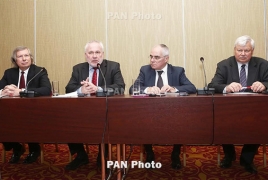OCSE Minsk Group talks culprits behind Karabakh escalation PanARMENIAN.Net - The OSCE Minsk Group has never been mandated to determine the initiator of attacks in Karabakh, the Russian Co-chair told reporters Saturday, April 9 in Yerevan. "The Minsk Group is only authorized to meet with the military-political leadership of both countries and visit Nagorno Karabakh," Igor Popov said. "Stabilizing the situation and taking steps against recurrence of military actions is our primary aim." According to Popov, the Co-chairs, after a number of meetings, concluded that both sides are willing to adhere to the Moscow-brokered ceasefire maintenance deal. "We'll be meeting in a week to once again discuss the peace process and the ways to take it back to the negotiating table," Popov noted, adding that the return of dead bodies is a key issue. In response to a question about the brutal murder of elderly Armenian civilians and soldiers, the U.S. Co-chair said that the mediators are "deeply concerned" about the reports of human rights violations. "We have seen the photos and met with the International Committee of the Red Cross (ICRC), demanding that the latter make a careful analysis of what has happened," James Warlick said. "Those reports are in the center of our attention." Asked about Russian Foreign Minister Sergey Lavrov's latest remarks implying Moscow's new proposals for the conflict settlement, Popov noted: "The Russian Foreign Minister has repeatedly rejected the existence of the so-called "Lavrov document." The Co-chairs have made several recommendations, offering some options, all of which, however, are based on three principles and six elements of the conflict settlement, repeated by mediators over and over again. Let me restate those principles: the right to self-determination, exclusion of the use of force, territorial integrity, as well as, most important among the six basic elements, the return of territories and reaching an agreement on Karabakh's status. None of these points is subordinate to the others. In addition to these principles and elements, there is also the question of the return of the refugees, issue of the status and the width of the corridor, connecting Nagorno Karabakh and Armenia, where peacekeeping activities must be organized. The peacekeepers are expected to be deployed in the final stage of the process, when the agreement on a peaceful settlement of the conflict is signed." In response to a question about a possible change of Minsk Group format in light of Turkey’s strong bias in favor of Azerbaijan, Warlick recalled "the very strong statement" by the Minsk Group in Vienna, urging restraint and respect for the ceasefire and calling for immediate negotiations on a comprehensive settlement. "Let's be clear about this: Turkey joined that statement and endorsed it. We look forward to working with all members of the Minsk Group, including Turkey," Ambassador Warlick noted. Asked if they realize the impossibility of Karabakh's accession to Azerbaijan, Popov said: "At the moment, this subject is a matter of negotiations." The parties to the Karabakh conflict agreed on a bilateral ceasefire along the contact line which came into force at midday, April 5. Prior to that, on the night of April 1-2, Azerbaijani armed forces initiated overt offensive operations in the southern, southeastern and northeastern directions of the line of contact with Nagorno Karabakh. As many as 46 Karabakh servicemen were killed and 122 were wounded in the course of military operations. As of April 5, the Azerbaijani side has lost 26 tanks and 4 infantry fighting vehicles, as well as 1 BM-21 Grad multiple rocket launcher, 1 engineering vehicle, 2 military helicopters and 11 unmanned aerial vehicles. The Azerbaijani side has admitted the loss of 31 fighters, 1 helicopter and 1 unmanned drones, whereas the Armenian side's photo and video materials show dozens of killed Azerbaijani troops, 1 helicopter and 3 UAVs. Opposition media outlets, however, reported on the death of 81 Azerbaijani soldiers, stating that 6 more have gone missing. According to Karabakh authorities, 300 Azerbaijani soldiers were killed in clashes. 14 Karabakh tanks have been neutralized since April 2. Related links:  The conflict between Nagorno Karabakh and Azerbaijan The conflict between Nagorno Karabakh and Azerbaijan broke out as result of the ethnic cleansing launched by the Azeri authorities in the final years of the Soviet Union. The Karabakh War was fought from 1991 (when the Nagorno Karabakh Republic was proclaimed) to 1994 (when a ceasefire was sealed by Armenia, NKR and Azerbaijan). Most of Nagorno Karabakh and a security zone consisting of 7 regions are now under control of NKR defense army. Armenia and Azerbaijan are holding peace talks mediated by the OSCE Minsk Group up till now. The Cabinet of Ministers decided on Thursday, November 9 to allocated AMD 120 million to arrange the gathering. Michael Roth believes sanctions must be put on the table after Baku‘s ethnic cleansing in Nagorno-Karabakh. The Yerevan City Council has elected Tigran Avniyan from the ruling Civil Contract as the mayor of the Armenian capital. The Armenian Parliament on Tuesday, October 3 voted to ratify the Rome Statute of the International Criminal Court. Partner news |